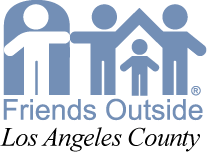In case our followers are wondering what a “Risson,” is (see our last newsletter) . . . some of the letters on my computer keyboard are no longer visible. Hence, I typed “Risson” instead of “Ribbon.” And, the typo made it through our proofreading “department.” The headline should have read “Weaver Appointed to Blue Ribbon Committee by Mayor Garcetti.” Mea culpa.
___________________________________________________________________________________
FOLA Partner in Newly-funded LEAP Grant by the U.S. Department of Labor
We are thrilled to learn that our partnership with the South Bay Workforce Investment Board and New Opportunities Charter School was just funded as one of 20 grants in the country that will receive funds to start a “One-Stop” employment center inside Los Angeles County Jails. According to its website, the U.S. Department of Labor explains the program in this way:
WASHINGTON — More than 9 million people are released from the nation’s more than 3,000 county and local jails every year, the U.S. Department of Justice reports. Many of these individuals have few job skills and face difficult barriers to stable employment. Without a strong support system or a steady job, many once incarcerated people are likely to commit new crimes and return to jail: a cycle of recidivism that recurs across the country.
To break the cycle, the U.S. Department of Labor is funding grants to provide comprehensive services to inmates before release and ongoing support as they regain their place in the community when their incarceration ends. The grants are funded by the “Linking to Employment Activities Pre-Release” or “LEAP” initiative.
“When someone leaves a county or local jail, very real barriers too often stand in their way as they try to find a good job and lead a successful life,” said U.S. Secretary of Labor Thomas E. Perez. “We have to do more to help them land on their feet as they return to their communities.”
“We have to work together and use existing resources in new, innovative ways to break the cycle of incarceration. The LEAP initiative encourages greater coordination between local workforce programs, correctional systems and other critical services to prepare inmates for jobs before release, and to continue to assist them as they return home,” Perez added. “This is a commonsense approach that strengthens communities and improves public safety at the same time.”
The goal of the LEAP initiative is to break down silos and help integrate two services already offered by local governments — correctional facilities and workforce development programs. In nearly every county, municipal or regional area, jail or correctional facilities are located near the approximately 2,500 American Job Centers in the U.S., funded by the U.S. Department of Labor, but administered by local government or a non-profit organization through a local workforce investment board.
By providing a direct “hand-off” of transitioning offenders to their area’s Job Center upon release, the newly released individual will receive follow-up, support and other services at a critical time to help guide them on a path toward a productive career and away from the risks that often return them to jail.
LEAP aligns closely with the principles driving President Obama’s My Brother’s Keeper initiative which seeks to address persistent opportunity gaps facing boys and young men of color and to ensure that all young people can realize their full potential.



 FCLCA is a co-sponsor of Sen. Holly Mitchell’s Senate Bill 1157, Strengthening Family Connections: In-Person Visitation. This bill preserves in-person visitation for people who are incarcerated in local detention and correctional facilities, including those detained under immigration holds, awaiting trial or serving sentences,and minors held in juvenile facilities.
FCLCA is a co-sponsor of Sen. Holly Mitchell’s Senate Bill 1157, Strengthening Family Connections: In-Person Visitation. This bill preserves in-person visitation for people who are incarcerated in local detention and correctional facilities, including those detained under immigration holds, awaiting trial or serving sentences,and minors held in juvenile facilities.